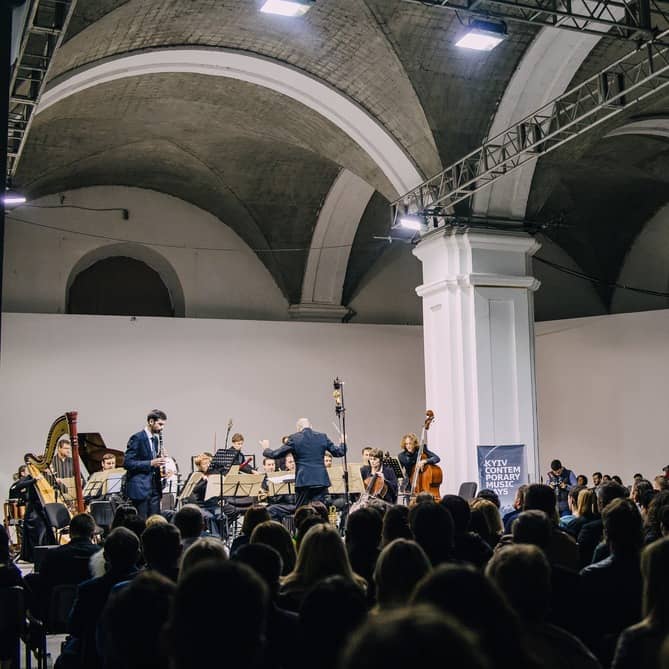
Solidarity Rather Than Pity
Les Vynogradov
One of the challenges of fundraising for Ukrainian musicians internationally is conveying the experiences of actual people going through the war while refraining from “war porn.” Wrecked tanks and dead bodies scattered around the once peaceful city streets; entire apartment blocks torn down by Russian missiles; women, men, and children, shell-shocked and with blood and soot on their faces, trying to escape this hell—these graphic images certainly travel fast and get instantly carved in memory. This is what Ukraine has come to be associated with over the past year.
All these images show the reality of Russia’s brutal war against Ukraine, but they don’t give you the full picture. Hundreds of thousands died, millions lost their homes and had to flee; but there are as many—in fact, even more—people who stayed in Ukraine and continue living their lives amidst Europe’s most high-intensity war since 1945. There are also those who travel back and forth between Ukraine and abroad, trying to raise awareness and funds to help their country. I’m not only talking about diplomats and politicians: there are also volunteers, entrepreneurs, artists, scholars, culture managers—and musicians. Today you may see them in London, Berlin, or New York but tomorrow they’ll be back in Kyiv, Lviv, or Dnipro, waking up to the sound of air raid sirens.
Media are hungry for arresting imagery. What they don’t show, however, is what happened a moment before and after a viral image was taken. In the fall of 2022, Russia started massive missile attacks on Ukraine’s energy system, which resulted in country-wide power outages. The web was full of eerie and slightly disturbing photographs from Ukrainian cities drowned in darkness. Ukrainians have adapted to this new reality quite fast, though. Whenever a blackout caught people in the middle of grocery shopping and the cash register stopped working, they would send money directly to the cashiers using banking apps on their smartphones. Small businesses bought diesel generators so even during power cuts, you could still enjoy a cup of Chemex at your favorite third-wave cafe. Thanks to incredibly brave utility workers around the country (some of who died while doing their job), the power shortages have had almost no effect on the timetables of Ukrainian railways—the number one means of long-distance transportation—and the trains kept coming on time.
With air raid alerts happening almost daily, often several times a day, and actual missile and drone attacks occurring roughly every week in different parts of Ukraine (in frontline areas artillery shelling and rocket attacks continue pretty much non-stop), Ukrainians go on with their lives. They go to the office or work remotely (a legacy of the COVID times that proved useful in new circumstances), walk their dogs who are now wearing reflective vests and collars to be seen in the dark, go to concerts in bomb shelters, and create TikToks for their beauty vlogs. Some work at their farms, some are translating Livy from Latin into Ukrainian, and some continue teaching students music theory.
It doesn’t mean they are safe, of course. Unfortunately, no one in Ukraine is completely safe right now, no matter where they are. Russians target civilian infrastructure and they have the capacity to hit even the westernmost parts of Ukraine, deep into the rear. Many Ukrainians stay because they can’t leave: they don’t have the means or have to look after a relative. But for many others, staying is a conscious choice. They stay because it’s their home: their friends and family, their job, their whole life is there. While clearly understanding the risks, they stay because that’s what they believe is right.
From March 2022 to this day, KCMD has helped over 300 Ukrainian musicians through our Support Fund for the Ukrainian classical music community. Many of them found themselves in extreme precarity, living under Russian shelling and left virtually without income: theaters would close for a while, orchestras wouldn’t play concerts, music school teachers and private tutors alike lost their students. Nevertheless, most of them continued working in music. While many recipients of our grant had to spend it on their most basic needs (food, medications, rent, etc.), many others could repair a damaged instrument, buy new strings, or rent a rehearsal space, thus being able to pursue their professional careers.
As the KCMD team got back on our feet after the initial shock of the full-scale invasion, we launched the Contemporary Classical Music Portfolio UA, a practical online tool for music professionals around the world to seek collaborations with their Ukrainian counterparts in the field of new music. With this Portfolio, we want to show there are many Ukrainian music professionals out there—composers, organizers, media—interested in international cooperation, whose contribution will make any project richer, deeper, and more diverse.
Whenever you think about Ukrainian musicians in need of help, please remember that they are not only the victims of Russia’s genocidal war, refugees and survivors. They are, first and foremost, professional musicians just like you who had a life not unlike yours before the full-scale invasion and who try to find a sense of normalcy even in this new atrocious reality. We don’t want this war to define who we are. We want to go on with our careers, grow professionally, and be useful wherever we are. Most of all, we need solidarity, not pity, from our colleagues around the world.
If you wish to support the Ukrainian music scene, you are very welcome to make a donation to our Fund or other Ukraine-based charities (they are much more efficient than big international organizations), as there are still many Ukrainians in need of humanitarian help. But perhaps more importantly, please consider cooperation with Ukrainian music professionals: include Ukrainian music in your program—there are plenty of amazing composers you have never heard of, from Baroque to electroacoustic and from Romantics to Minimalists; platform Ukrainian voices; and invite Ukrainian musicians, composers, musicologists, and other music professionals to join projects with you. Initiate a peer-to-peer dialogue rather than one-way assistance, an exchange beneficial to all the participants, and this way, nurture exciting new partnerships built on a genuine interest in each other’s music.
Subjects: Ethics
